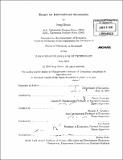Essays on International economics by Sergi Basco.
Author(s)
Basco, Sergi (Basco Mascaro)
DownloadFull printable version (10.07Mb)
Other Contributors
Massachusetts Institute of Technology. Dept. of Economics.
Advisor
Daron Acemoglu, Ricardo J. Caballero and Pol Antràs.
Terms of use
Metadata
Show full item recordAbstract
This dissertation analyzes different aspects of the globalization process. In recent years we witnessed an increasing role of emerging economies in world capital markets. Moreover, there has been a large reduction in trade costs which has allowed production to be offshored to less developed economies. Both elements are part of the globalization process but they have different effects within and between countries. The first essay studies the relationship between globalization and the appearance of rational bubbles. It shows that bubbles cannot appear in a financially developed economy in autarky. In contrast, as globalization progresses, more financially underdeveloped economies have access to world capital markets and the possibility of having a bubble in the financially developed country increases. It also shows that, conditional on having a bubble, globalization raises house prices only when the bubble is attached to houses. The second essay, co-authored with Marti Mestieri, analyzes the distributional effects of two waves of globalization. A First Globalization characterized by trade liberalizations and a Second Globalization characterized by reductions in communication costs. It shows that wage inequality always rises in the South. However, wage polarization emerges in the North during the Second Globalization. Moreover, there exists a complementarity between both globalizations. Wage polarization is delayed by the extent of trade in the First Globalization. It also shows that heterogeneous participation in Second Globalization trade generates a discontinuous pattern of specialization. The third essay studies how financial institution differences affect the offshoring choice of firms. It shows that financial institution differences affect the optimal contract offered to the supplier and are enough to generate a product cycle. Production is kept in North when the good is new and it is shifted to the South as it becomes more standardized.
Description
Thesis (Ph. D.)--Massachusetts Institute of Technology, Dept. of Economics, 2010. Cataloged from PDF version of thesis. Includes bibliographical references (p. 151-160).
Date issued
2010Department
Massachusetts Institute of Technology. Department of EconomicsPublisher
Massachusetts Institute of Technology
Keywords
Economics.